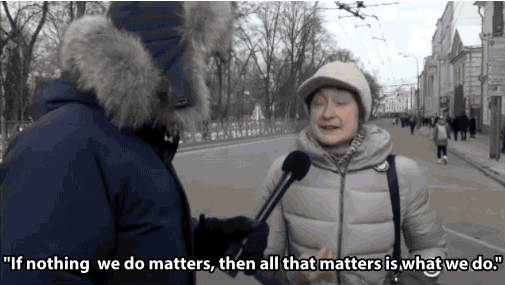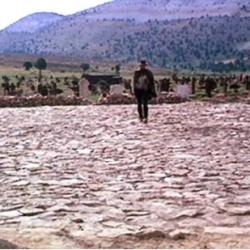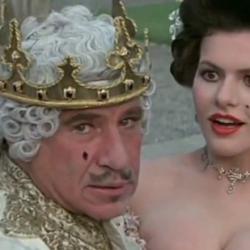So The Daily Show correspondent Jason Jones went to Russia. Really — he didn’t just stand in front of a green screen in their studio with stock footage of Red Square projected behind him, he actually, physically went to Russia and interviewed citizens there about that country’s ugly new anti-gay legislation.
The Daily Show website summarizes the segment this way: “Jason Jones questions Russian citizens about gay rights and finds their opinions compare favorably with American views — of 40 years ago.” And the first five and a half minutes of the report are almost relentlessly bleak and hopeless.
But then Jones cuts back to an interview with one more Russian citizen, one woman in all of Moscow. She alone wields the hope and the determination to fight the bigots, homophobes and the forces of hate; to stop the spread of their evil and the swell of their number.
Well, OK, that’s a bit overwrought, maybe. But it’s appropriate because this woman turns out to be a big Buffy fan, and she seems just as brave and determined as any slayer or champion.
“Are you hopeful that Russia can change?” Jones asks her.
“I have to hope,” she says, “because otherwise it’s too depressing.”
So she hopes, but she is not optimistic. She protests as though her actions can make the world better, even though she doesn’t expect that they will. “I really do it just to not be ashamed of myself,” she says. “I want to look in the eyes of my children and grandchildren and say, ‘I did all I could.'”
And then, to sum it up, she shares an inspiring quote. It’s not from Martin Luther King Jr., or Vaclav Havel, or Aung San Suu Kyi. It’s from the Buffy spin-off Angel, season 2, episode 16:
That’s from this scene:
Here’s the full quote:
If nothing we do matters, then all that matters is what we do. ‘Cause that’s all there is. What we do. Now. Today. … All I wanna do is help. I wanna help because, I don’t think people should suffer as they do. Because, if there’s no bigger meaning, then the smallest act of kindness is the greatest thing in the world.
That right there is what “collapsing the transcendent into the immanent” looks like in practice (in practice being the key point). And, as I wrote last week — quoting Richard Beck — “I’m very happy with this move.”
That move doesn’t require one to stop believing in anything transcendent. It simply asserts that the reality and/or unreality of the transcendent should not affect what we do, now, today.
It may be true, as the detective said, that “maybe we’re not alone in this.” It may be true, as the preacher said, that “the arc of the universe is long, but it bends toward justice.”
I believe that. But I can’t prove it. The evidence I have regarding that claim is inconclusive at best. The arc is too long to say with confidence what it may be bending toward — or if it’s even bending, if it’s even an arc, at all.
I believe in ultimate justice. I hope that’s true. But what we do is what matters.
Or, to say the same thing in other words: “These three abide: faith, hope and love. But the greatest of these is love.”













